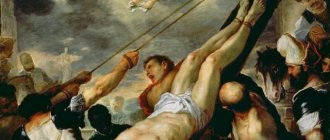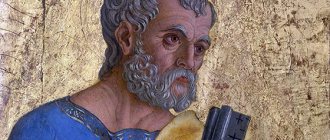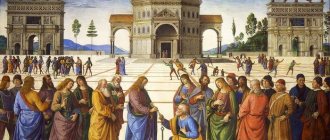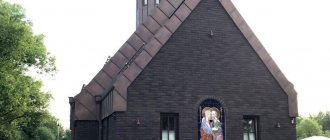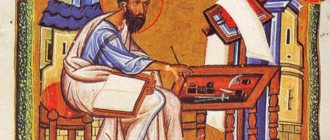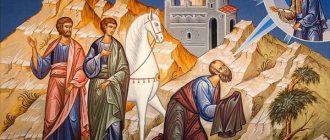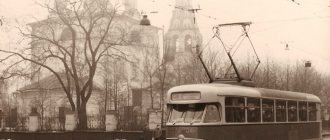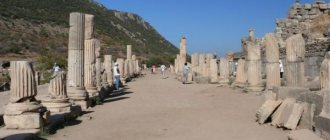Righteous Tabitha: life according to God
Righteous Tabitha
A virtuous and merciful woman from the Christian community in Joppa, righteous Tabitha sewed clothes and earned her food with her own hands, and also “did alms”: she sewed for poor orphans and widows. This is, perhaps, all we know about the life of the saint. It seems that the skillful hand of God’s Providence deliberately left us only these subtle outlines of the image of historical Tabitha. Just a few lines from the Acts of the Holy Apostles (9: 36–42). But this was enough for the Church to glorify the saint as “a heavenly-wise disciple and an animated icon of God’s grace.” It is enough that after her death the cry of widows aggravated by grief forced the Apostle Peter to enter the deceased and by the power of God bring her back to life, saying: “Tabitha, arise!” (Acts 9:40)…
The courage of martyrs, the strength of ascetics - all this is close to every Christian in the power of patience and silence.
But the saint was silent. She did not dare to take on the burden of teaching, did not dare to undertake apostolic labors, only “in deep humility she did works of mercy, known only from those closest to her.” She served with what she had, what God gave her. She wasn’t burdened by society, she wasn’t sad about the modesty of her work, she was simply grateful. And this is what amazes most in the life of any saint - the amazing ability to remain silent in response to the most unfavorable circumstances, to the most inconvenient accidents. Humble acceptance of what is happening for granted and gratitude for everything sent from God is the answer of the powerful of this world. And here the main strength is not to judge, not to try to decide instead of God what is more useful for me in life, where I can bring more benefit. Ultimately, it is this silence that gives meaning to all the exploits and labors of the righteous. It turns out that the height of the apostolic preaching, the courage of the martyrs, the strength of the ascetics of the desert - all this is completely close to every Christian in the power of patience and silence, in the power of recognizing God as the Master of our life.
The righteous life of Saint Tabitha in this sense provides us with a particularly inspired example. “Rejoice, heavenly wise and God-pleasing woman... Rejoice, zealous angelic rank... Rejoice, for for your sake ancient Joppa flourished... Rejoice, heavenly pillar of divine virtues...” exclaims the church hymnographer. One has only to think that these words were spoken in honor of a simple woman who humbly helped her neighbors with her handicrafts! “Sad compassion is quiet…” - this is how the Holy Church addresses righteous Tabitha. And in this one phrase the greatness of the saint’s feat is reflected. Not attaching much importance to her labors, not daring to teach and instruct, she meekly fulfilled the Savior’s commandments in relation to those who were nearby. And with this “immaculate life, the fulfillment of the law of the Gospel, the fruitful olive tree appeared in the house of God” and “the helper of the disciple Spasov”! Great is the silence of the righteous!
At the end of time, some will talk about the greatness of their deeds... and in response they will unexpectedly hear: “I never knew you; Depart from me, you workers of iniquity."
Others will silently await the Creator's verdict. And God’s answer will be amazing: “Come, you blessed of My Father, inherit the kingdom prepared for you from the foundation of the world.”
Here we encounter an amazing pattern of spiritual life. It turns out that at the end of time some will speak with confidence about the greatness of their deeds performed “in the name of Christ,” asking the Creator: “Lord! Have we not prophesied in Your name? and was it not in Your name that they cast out demons? and didn’t they do many miracles in Your name?” But in response they will unexpectedly hear: “I never knew you; Depart from Me, you workers of lawlessness” (Matthew 7:22–23). Others, on the contrary, ashamed of the insignificance of their lives, will silently await the Creator’s verdict. And God’s response to their silence will be amazing: “Come, you blessed of My Father, inherit the kingdom prepared for you from the foundation of the world” (Matthew 25:34).
In the life of righteous Tabitha, the greatness of the feat of Christian life according to God is manifested with particular clarity. “Rejoice, Tavitho, vessel filled with grace!” - those who honor the memory of the saint appeal. Thus, the most essential law of life is confirmed again and again: next to God there is nothing bad, nothing unnoticed, nothing useless, but everything accepted from Him with simplicity of heart and humility is worthy of the highest title - a participant in eternity, the son of the Most High! On the contrary, no matter how plausible and virtuous the feat may seem, no matter how society extols this or that heroic deed, authority - all this without God is worth absolutely nothing, because for eternity it is useless!
Temple of the Holy Apostle Peter and Righteous Tabitha on the Russian site in Jaffa
[1]. The only city in the Holy Land founded by Arabs. [2]. Mamluks. Mamluks (Arabic - white slaves, slaves), slave warriors (from the Turks, as well as Georgians, Circassians and other Caucasian peoples in Egypt), from whom the guard of the rulers of the Ayyubid dynasty (1171-1250) was formed. TSB.
[3]. V. N. Khitrovo. “A Week in Palestine From Travel Memories.” St. Petersburg 1879 2nd edition. pp. 5-6
[4]. Sergey Mech. "A Trip to Palestine." (Geographical sketch). 1895
[5]. Russia in the Holy Land. Documents and materials. Volume II. 61. Act on the establishment of the waqf by Archimandrite Antonin. September 12, 1889 p. 218. Jaffa.. Moscow. "International relationships". 2000. Archive of the foreign policy of the Russian Empire, Ministry of Foreign Affairs of the Russian Federation, IOPS, Institute of Russian History of the Russian Academy of Sciences.
[6]. Russia in the Holy Land. Documents and materials. Volume I. 17. Inventory of all Russian real estate in Palestine and Syria, with the exception of private ownership, appendix to the report of A. G. Yakovlev to the ambassador in Constantinople A. I. Nelidov. page 98. Moscow. "International relationships". 2000. Archive of the foreign policy of the Russian Empire, Ministry of Foreign Affairs of the Russian Federation, IOPS, Institute of Russian History of the Russian Academy of Sciences.
[7]. O. L. Tserpitskaya. Archimandrite Antonin (Kapustin) and Russian shrines in the Holy Land. Journal of St. Petersburg Diocesan Gazette. 2000 No. 21-22
[8]. Archimandrite Cyprian (Kern). Archimandrite Cyprian (Kern). O. Antonin Kapustin Archimandrite and head of the Russian Spiritual Mission in Jerusalem. Chapter VIII. Jerusalem years. Page 179
[9]. Archimandrite Nikodim (Rotov). "History of the Russian Spiritual Mission in Jerusalem." Chapter III. Archimandrite Antonin (Kapustin) and the Russian Spiritual Mission under his direction. Page 255. Edition of the Serpukhov Vysotsky Monastery 1997
[10]. Archimandrite Cyprian (Kern). Archimandrite Cyprian (Kern). O. Antonin Kapustin Archimandrite and head of the Russian Spiritual Mission in Jerusalem. Chapter VIII. Jerusalem years. Page 179. Krutitsky Compound Publishing House. Society of Church History Lovers. Moscow 2005
[eleven]. V. N. Khitrovo. “A Week in Palestine From Travel Memories.” St. Petersburg 1879 2nd edition. pp. 5-6
[12]. Waqf, Arabic, according to Islamic law, inalienable property withdrawn from civil circulation. Initially - lands conquered by Muslims from infidels; they were the property of the state, but were left for a certain duty (kharaj) in the hereditary possession and use of the previous owners. Then V. name. property donated to mosques and charitable institutions. In contrast to spiritual (legal) V., private (ordinary) V. were established in favor of certain clans. The management of private V. is in the hands of the clergy for a large reward, and the income goes to the benefit of certain individuals. Such V. arose to protect property from the seizures of selfish administration in the east. states. In Russia, V. are found in the Crimea and in small numbers in Transcaucasia and Turkestan. In 1885, a commission was established in Crimea to regulate the vacancies. property. Small encyclopedic dictionary of Brockhaus and Efron.
[13]. “Russia in the Holy Land. Documents and materials." Volume II. 61. Act on the establishment of the waqf by Archimandrite Antonin. September 12, 1889 p. 218. Jaffa.. Moscow. "International relationships". 2000. Archive of the foreign policy of the Russian Empire, Ministry of Foreign Affairs of the Russian Federation, IOPS, Institute of Russian History of the Russian Academy of Sciences.
[14]. Lydda is the modern city of Lod. According to the tradition of the Jerusalem Church, the saint’s mother lived here, and he was buried here. Church of St. George the Victorious in Lydda, built in the 4th century.
[15]. N. N. Lisova. “Come and see. Testimonies of God on Earth." Temple of the Apostle Peter and Righteous Tabitha in Jaffa. Page 241.
[16]. Quote by Dmitrievsky A. A. The head of the Russian Spiritual Mission in Jerusalem, Archimandrite Antonin (Kapustin) as a figure for the benefit of Orthodoxy in the East, and in particular in Palestine. (On the tenth anniversary of his death) // Messages of the IOPS. 1904. T. XV Issue 2.p. 95–148. S. M. Dmitrevsky “Russian excavations on Olivet.” Moscow. 2006 Publishing house "Indrik" p. 77
[17]. Report from the head of the Russian Ecclesiastical Mission in Jerusalem, Archimandrite Antonin, in St. Synod. October 28, 1885). AVP RI, f. RIPPO, op. 873/11, d., l., 16–17. “Russia in the Holy Land. Documents and materials." Volume II. pp. 199–200. Moscow. "International relationships". 2000. Archive of the foreign policy of the Russian Empire, Ministry of Foreign Affairs of the Russian Federation, IOPS, Institute of Russian History of the Russian Academy of Sciences.
[18]. From the diary of the arch. Antonina (Kapustina) for September 28-October 6, 1888. Quoted from “Construction of the Church of St. Mary Magdalene on the Mount of Olives in Jerusalem. Page 118. Moscow. 2006 Publishing house "Indrik".
[19]. TsGIA SPb. f. 834. 1817–1894. op. 1118–1131. No. 4. Quoted from the above-mentioned article by O. L. Tserpitskaya.
[20]. TsGIA SPb. f. 797. 1841–1890. op. 11, 32–34, 39–41, 43, 45, 47–49, 58, 59, 63, 64, 94. No. 27, 29, 32, 34, 39, 45, 47–49, 55–59 , 98, 103, 108, 128, 182, 194, 232, 452. Quoted from the above-mentioned article by O. L. Tserpitskaya.
[21]. N. N. Lisova. “Come and see. Testimonies of God on Earth." Temple of the Apostle Peter and Righteous Tabitha in Jaffa. Page 241. Publishing house of the information agency of the Russian Orthodox Church. Moscow 2000
[22]. Timofeev Vladimir Nikolaevich - consular agent in Jaffa in 1885–1894. He died in 1894 and was buried behind the altar of the Russian Church in the name of the Holy Apostle Peter and Righteous Tabitha in Jaffa. Quoted from the collection Russia in the Holy Land. Documents and materials. Volume II. Page 173. Moscow. "International relationships". 2000. Archive of Foreign Policy of the Russian Empire, Ministry of Foreign Affairs of the Russian Federation, IOPS, Institute of Russian History of the Russian Academy of Sciences.
[23]. Ledakov Anton Zakharovich, studied at the Academy of Arts (1859-1864), received the title of class artist 3rd degree (1867). Author of icons for the Russian church in Jaffa. Quoted from the collection Russia in the Holy Land. Documents and materials. Volume II. Page 173. Moscow. "International relationships". 2000. Archive of Foreign Policy of the Russian Empire, Ministry of Foreign Affairs of the Russian Federation, IOPS, Institute of Russian History of the Russian Academy of Sciences.
[24]. Letter from the assistant to the chairman of the Imperial Orthodox Palestine Society M.P. Stepanov to the Head of the Russian Spiritual Mission in Jerusalem, Archimandrite Antonin Kapustin, April 8, 1891, AVP RI, f. RIPPO, op. 837/1, d.589, l.3. Quoted from the collection Russia in the Holy Land. Documents and materials. Volume II. Page 74. Moscow. "International relationships". 2000. Archive of Foreign Policy of the Russian Empire, Ministry of Foreign Affairs of the Russian Federation, IOPS, Institute of Russian History of the Russian Academy of Sciences.
[25]. Letter from the assistant to the chairman of the Imperial Orthodox Palestine Society M.P. Stepanov to the Head of the Russian Spiritual Mission in Jerusalem, Archimandrite Antonin Kapustin, December 3, 1891. AVP RI, f. RIPPO, op. 837/1, d.7–7 vol.. Quoted from the collection Russia in the Holy Land. Documents and materials. Volume II. Page 75. Moscow. "International relationships". 2000. Archive of the foreign policy of the Russian Empire, Ministry of Foreign Affairs of the Russian Federation, IOPS, Institute of Russian History of the Russian Academy of Sciences.
[26]. A brief guide for Orthodox Russian pilgrims going to worship the holy places of the East. IOPS publication. St. Petersburg 1907
[27]. Spiritual testament of the head of the Russian Spiritual Mission in Jerusalem, Archimandrite Antonin (Kapustin). March 19, 1894. Copy of an extract from the Register Book of the Imperial Russian Consulate General in Jerusalem for the year 1894, pp. 249–252, No. 291. Russia in the Holy Land. Documents and materials. Volume II. Page 227. Moscow. "International relationships". 2000. Archive of the foreign policy of the Russian Empire, Ministry of Foreign Affairs of the Russian Federation, IOPS, Institute of Russian History of the Russian Academy of Sciences.
[28]. Verga - and “ushur”, i.e. land tax and tithe collection from the harvest. Shumov S.A., Andreev A.R. from Iraq: history, people, culture. Chapter 3. Part 3. Ottoman Empire. Türkiye. Great Britain. XVI-XX centuries.
[29]. Report from the Manager of the Consulate General in Jerusalem A.G. Yakovlev to the Ambassador in Constantinople A.I. Nelidov. September 26, 1894. “Russia in the Holy Land. Documents and materials." Volume II. Page 232. Moscow. "International relationships". 2000. Archive of the foreign policy of the Russian Empire, Ministry of Foreign Affairs of the Russian Federation, IOPS, Institute of Russian History of the Russian Academy of Sciences.
[thirty]. Sergey Mech. "A Trip to Palestine." (Geographical sketch). 1895
[31]. P. V. Platonov. “The life and needs of Russian Orthodox worshipers in the Holy Land in the 19th–21st centuries.” Publication on the website “Russia in Colors” https://ricolor.org/russia/ippo/1/lekzia21/
[32]. Right there.
[33]. Report on the audit of the monetary and material economy and on the review of real estate, accounting and reporting of the Russian Spiritual Mission in Jerusalem dated November 4, 1914. “Russia in the Holy Land. Documents and materials." Volume II. pp. 160–161. Moscow. "International relationships". 2000. Archive of the foreign policy of the Russian Empire, Ministry of Foreign Affairs of the Russian Federation, IOPS, Institute of Russian History of the Russian Academy of Sciences.
[34]. N. N. Lisova. “Come and see. Testimonies of God on Earth." Temple of the Apostle Peter and Righteous Tabitha in Jaffa. Page 241.
[35]. Right there.
Sunday, November 7, 2022
Sunday is a day off, which every Christian devotes to God and His works, first of all, to visiting church. On this day we put aside other things to participate in the liturgy.
In the “Preparing for the Resurrection” project, we are trying to help you consciously come to Church, study the traditions and features of worship in advance, get acquainted with a passage from Holy Scripture and its interpretations, as well as the short lives of the saints commemorated by the Church on Sunday - November 7 .
Reading the Gospel:
Gospel of Luke, chapter 16, verses 19 - 31
Read excerpt
19 A certain man was rich, dressed in purple and fine linen, and feasted magnificently every day. 20 There was also a certain beggar named Lazarus, who lay at his gate covered with sores, 21 and wanted to feed on the crumbs that fell from the rich man’s table, and the dogs came and licked his sores. 22 The beggar died and was carried by the angels to Abraham’s bosom. The rich man also died and was buried. 23 And in hell, being in torment, he raised his eyes, saw Abraham in the distance and Lazarus in his bosom 24 and cried out, saying: “Father Abraham! have mercy on me and send Lazarus to dip the tip of his finger in water and cool my tongue, for I am tormented in this flame.” 25 But Abraham said: “Son! remember that you have already received your good in your life, and Lazarus received your evil; now he is comforted here, and you suffer; 26 And besides all this, a great gulf has been established between us and you, so that those who want to cross from here to you cannot cross, nor can they cross from there to us.” 27 Then he said: “So I ask you, father, send him to my father’s house, 28 for I have five brothers; let him testify to them, so that they too do not come to this place of torment.” 29 Abraham said to him, “They have Moses and the prophets; let them listen to them." 30 And he said, “No, Father Abraham, but if someone from the dead comes to them, they will repent.” 31 Then Abraham said to him, “If they do not listen to Moses and the prophets, they will not believe even if someone were raised from the dead.”
Collapse
Priest Pavel (Velikanov) comments
Gospel of Matthew, chapter 10, verses 1 - 8
Read excerpt
1 And calling His twelve disciples, He gave them power over unclean spirits, to cast them out and to heal all manner of sickness and all manner of disease. 2 And the names of the twelve apostles are these: first Simon, called Peter, and Andrew his brother, James Zebedee and John his brother, 3 Philip and Bartholomew, Thomas and Matthew the publican, James Alphaeus and Levbeus, called Thaddeus, 4 Simon the Canaanite and Judas Iscariot, who betrayed Him. 5 These twelve Jesus sent, and commanded them, saying, Go not into the way of the Gentiles, neither enter into the city of the Samaritans; 6 But go ye especially unto the lost sheep of the house of Israel; 7 As you go, preach that the kingdom of heaven is at hand; 8 Heal the sick, cleanse the lepers, raise the dead, cast out demons; freely you have received, freely give.
Collapse
Priest Anthony (Borisov) comments
Apostolic reading:
The Epistle of the Apostle Paul to the Galatians, chapter 1, verse 11 - 19
Read excerpt
11 I declare to you, brethren, that the gospel which I preached is not that of men, 12 for I also received it and learned it, not from man, but by the revelation of Jesus Christ. 13 You have heard about my former way of life in Judaism, that I cruelly persecuted the Church of God and devastated it, 14 and prospered in Judaism more than many peers in my generation, being an immoderate zealot of my fatherly traditions. 15 But when God, who chose me from my mother’s womb and called me by His grace, was pleased 16 to reveal His Son in me, so that I might preach Him to the Gentiles, I did not then consult with flesh and blood, 17 and did not go up to Jerusalem to those who preceded me. to me the Apostles, but went to Arabia, and again returned to Damascus. 18 Then, after three years, I went to Jerusalem to see Peter and stayed with him for fifteen days. 19 But I saw no other of the apostles except James the brother of the Lord.
Collapse
Bishop Feoktist (Igumnov) comments
Features of Orthodox worship: learning to understand the liturgy
Last time we explained what antiphons are and when they are sung. Today we will talk about how the “small entry” occurs.
At the end of the singing of the third antiphon, “Glory to the Father and the Son and the Holy Spirit” sounds. At this time, the priest (if he serves with a deacon or with other priests, then all together) makes three bows at the altar before the Holy Altar. Then the Small Entrance begins: the priest takes the altar Gospel, passes it to the deacon (or carries it himself), one after another they exit through the northern gate, and the altar boy carries a large candle in front of them.
Then the priest says a special prayer of entry: “Sovereign, Lord our God, who has established in heaven the regiments and armies of Angels and Archangels to serve Your Glory! Make it possible that with our entrance the entrance of the holy Angels will take place, serving with us and praising Your goodness. For to You is due all glory, honor and worship, to the Father and the Son and the Holy Spirit, now and always, and unto ages of ages. Amen".
Then the priest blesses the small entrance, and the deacon gives him the Gospel, which the priest kisses. Then the deacon turns to the parishioners and raises the Gospel above his head and addresses those praying in the church: “Wisdom, forgive me,” which means: “Wisdom! Let us become reverent!”
The deacon bows and leaves the altar, placing the Gospel on the altar. Behind him, a priest enters the altar. At this time, a call to believers sounds in the temple:
“Come, let us worship and fall before Christ.
Save, Son of God,
Raised from the dead, we who sing to You:
Alleluia"
To be continued in the next issue.
Read the sequence of the Liturgy
Saints' Day
Righteous Tabitha of Joppa (I)
a brief description of the righteous needlewoman at the cross of the Apostle Peter on radio “Vera”.
Martyr Anastasius of Aquileia, Salonsky (III)
Listen to the short life of the patron saint of Saloni (now the city of Solin in Croatia) on radio “Vera”.
Martyrs Marcian and Martyrius (about 355)
Listen to the short life of the reader Marcian and subdeacon Martyrius on radio “Vera”.
Venerable Deacon Martyry and Recluse Martyry of Pechersk, in the Far Caves (XIII–XIV)
Deacon Martyriy labored in the Kiev-Pechersk monastery and pleased God - during his lifetime he became famous for the gift of miracles. The 7th canon of the canon speaks to the monk of the Far Caves about his hard work, righteousness, purity of heart, gifts of casting out demons and healing ailments.
No information has been preserved about the recluse Martyria. Like Deacon Martyrius, he acquired incorruption and rests in the Far Caves in Kyiv.
